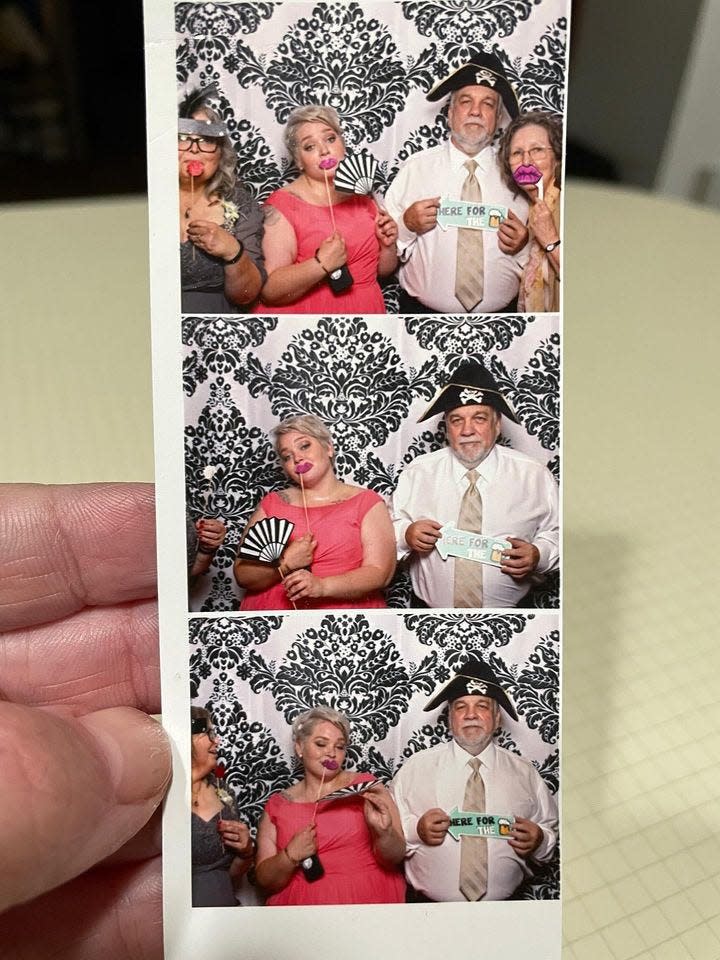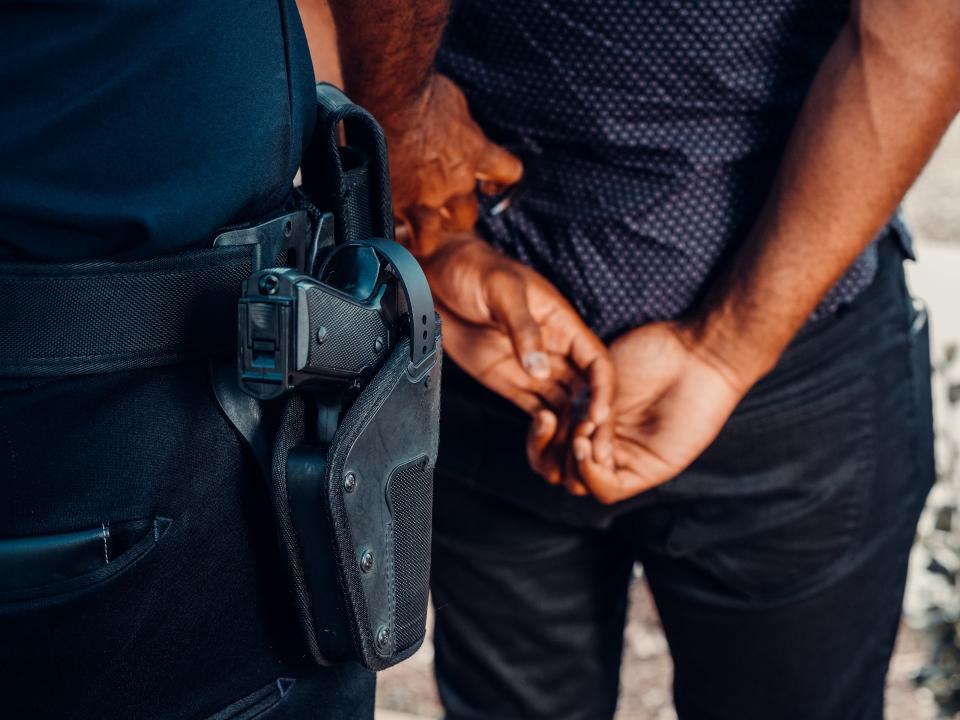New Florida law creates guidelines for law enforcement registries for disabled people
When Beth Stratton's dad was struggling with Alzheimer's, having the police called on him was her No. 1 fear.
Her father, who passed in 2023, dealt with aggression in the later days of his battle with the disease, and would sometimes wander from their home. Getting him comfortable was a struggle, and sometimes he would remove his clothing throughout the day.
"It was always a concern for us that a naked, violent man would be walking down the street, and someone would call the cops," said Stratton, a Sebring resident. "Obviously if police showed up, then that would also potentially, likely ... lead to violence, just because if he's being violent, that that's what cops are trained to do."
Now, House Bill 1275, which passed during Florida's 2023 legislative session and went into effect Jan. 1, creates guidelines for local registries of disabled people. These registries allow disabled people or their caregivers to enter their information into a database, giving local law enforcement access to their diagnoses.
Opinions on how to lower rates of violence against disabled people by police are mixed. It's estimated that nearly half of people killed by police are disabled, and that 33 to 50% of all use-of-force incidents by police in the U.S. involve a disabled person, according to the National Alliance on Mental Health.

The hope is that registries will provide officers with necessary context when approaching someone with a disability.
But some say this approach is not the answer, as the bill does not require law enforcement to take any training regarding what different disabilities look like or how to react nonviolently.
"Information of this sort is so dangerous to collect, and the better practice would really be to just train police to address the needs of people with disabilities," said Diane Smith Howard, managing attorney for institutes and community integration at National Disability Rights Network.
Who qualifies for the registries?
HB 1257 creates guidelines for local registries for those with developmental, psychological and other disabilities that "may be relevant to their interactions with law enforcement."
These conditions can include autism spectrum disorder, Alzheimer's disease or a dementia-related disorder, Down syndrome and others.
Stratton's father would have qualified. But it's not an approach she's comfortable with, she said, adding that her family relied on their community for support.
"You can't regulate that necessarily, but community building was the only thing that I felt safest in," she said.
Here in Brevard: Brevard deputies say they tasered an autistic man holding a knife. So, where's the blade?
COVID on the uptick: Following national trends, Florida is seeing a spike in COVID driven by JN.1 variant
How does someone get placed on a registry?
A disabled adult can enroll themself in their local registry. Disabled minors may be enrolled by their parents or a guardian, and disabled adults who are under a guardianship can be enrolled by their guardian.
Anyone — both minors and adults — enrolled by another person must be notified of the enrollment within a registry by local law enforcement in writing either within five days following the enrollment, or in the case of a minor, within five days following their 18th birthday.
At the time of enrollment, proof of an individual's disability status must be provided in the form of a letter from a physician, physician assistant, advanced practice registered nurse, psychologist, mental health counselor or a psychiatrist. If a parent or guardian is enrolling the disabled person, they must provide documentation such as a birth certificate, power of attorney, a court order establishing parental rights or guardianship or letters of guardianship.
While the law limits who can enter a disabled person on a registry, it still raised concerns for Howard.
"Family members may include inaccurate information about diagnoses, and some family members do it for the wrong reasons," she said.

Can I be taken off a registry?
A disabled minor or adult under a guardianship may be removed from the registry by their parent or guardian. If an adult was placed on the registry as a minor but would like to be taken off, they can do so following their 18th birthday.
What information is included?
The registry "may include, but need not be limited to" information including the disabled person's name, contact information, personal identifying information and their disability. If a parent or guardian enrolled the disabled person, the parent or guardian's name, contact information and personal identifying information will be kept in the registry. Additional information provided by the disabled person or the parent or guardian may be kept in the registry as well, such as the certification of a disability.
This information is exempt from public record through House Bill 1277, a companion bill to HB 1275. HB 1277 exempts all records and personal information of the people enrolled in the registry from public records. Information can be shared between law enforcement agencies, emergency management agencies, fire departments and other local, state or federal agencies in the "furtherance of the official duties and responsibilities of the agency holding the information," according to HB 1277.
While the registry information is protected from public records, Stratton said having that information on a list still made her uncomfortable based on other legislation passed by the state.
"Certain politicians like to point out what they see as a connection between certain diagnoses with identities like being trans or being queer," she said. "Having a database of people with autism or something like this, things that they have pointed to, sounds dangerous."
While multiple bills related to LGBTQ people that passed during the 2023 session in Florida did not mention any disabilities by name in their text, autism was brought up on the legislative floor during discussion. States such as Missouri and Georgia have attempted to use autism diagnoses as a way to restrict gender-affirming care.
Are such registries new?
Some places in Florida already had registries for disabled people and law enforcement to use prior to the passage of this bill, including Duval County, Seminole County, Hillsborough County and the city of Davie.
The law does not create a larger database, but rather puts up guidelines for local registries.
Olivia Keller, senior public policy analyst for Disability Rights Florida, helped work with the legislature on the bill and its companion. While law enforcement is authorized to share information from a local registry with relevant authorities, she said there's no database that law enforcement anywhere in the state can look at.
"If you're on Polk County's registry, for example, Hillsborough County doesn't necessarily know that," she said. "They're very localized."
Advocates: 'No evidence' to suggest registries work
While she said training police would be a better approach and even involving police as little as possible in situations where a crime is not being committed, Howard said the law was likely a "well-meaning attempt" to improve interactions between law enforcement and disabled people.
"It's important that there's a recognition that people with disabilities may not be able to advocate appropriately sometimes on their own behalf and when interacting with police, and that ... their needs may need to be addressed differently and certainly in a less punitive manner," she said.
Keller said the bill helped create guidelines around registries.
"It allows (registries) to exist, but it did put some important guardrails around them," she said, adding that with the passage of the bill, disabled people on registries are no longer added to the Florida Crime Information Center anymore, as these registries are only local rather than statewide.
Still, she said Disability Rights Florida has "serious reservations" about registries used by law enforcement for disabled people.
"There's no evidence ... that shows that these do what law enforcement says they do, in that they keep people with disabilities safe," she said, adding that at best, anecdotal stories seem to indicate registries aren't helpful and at worst, put disabled people in more danger.
Keller said she feels training and evidence-based policies need to be a part of how law enforcement interacts with disabled people, something she feels is missing from this law.
"They may be going off of their own biases," she said. "They have a nephew that's on the autism spectrum, so their experience with autism is with a 4-year-old, who may be entirely different than the 25-year-old with autism whom they're getting ready to interact with."
Stratton questioned the purpose of the law without a requirement for training.
"I would think the whole point of this bill would be to include training," she said. "Just knowing that someone is disabled going into the situation — if you don't know how to handle that, then what's the point?"
Finch Walker is the education reporter at FLORIDA TODAY. Contact Walker at 321-290-4744 or fwalker@floridatoday.com. X: @_finchwalker.
This article originally appeared on Florida Today: Disabled Floridians can be added to police registries: What to know

